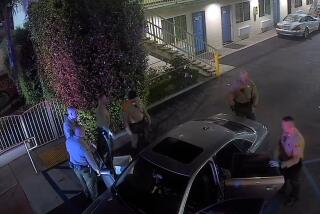Jury Acquits Corona Chief and Deputy of Conspiracy
- Share via
RIVERSIDE — Corona Police Chief Bob J. Talbert and Deputy Chief Edward D. Sampson were found not guilty of conspiring to obstruct justice by a Riverside County jury Wednesday.
The verdict, which came after two weeks of testimony and about a day and a half of deliberations, was greeted with cheers and applause from the chiefs’ families and friends who had gathered in the courtroom.
Talbert’s eyes filled with tears as he turned to embrace his defense attorney, shake the hand of his deputy, then embrace his wife.
Although their elation was clearly visible, Corona’s two highest-ranking law enforcement officers could find few words to describe their feelings at the end of an ordeal that began 10 months ago, when a group of their subordinates took a list of complaints to the Corona City Council.
Among the complaints was a charge that the pair had ordered officers to alter a police report of a 1982 traffic accident that claimed the life of a 17-year-old Corona boy. From that charge there followed an investigation by the Riverside County district attorney and, in August, a single-count indictment by the Riverside County Grand Jury.
Since then, Talbert and Sampson have been receiving their regular salaries while on administrative leave of absence from their duties. Neither has decided when, or if, he will return to work, they said Wednesday after the verdict was announced.
“I don’t have any thoughts together on that,” Talbert said. “. . . I’ll have to take some time to think.”
Sampson said he plans “to take things one step at a time. Now that this is over with, I can think of (returning).”
Corona’s city manager, James Wheaton, said he has offered to allow Talbert to take a vacation before making any decision to return to work, but has not yet had an opportunity to speak with Sampson.
Talbert is already eligible for early retirement, with 97% of his full pension, Wheaton said. And Sampson, he said, has applied for a stress disability pension.
But for now, Wheaton said, “as far as we are concerned, he’s deputy chief and he’s coming back. . . . I just have to say I’m elated.”
‘Wasn’t Enough Evidence’
Jurors interviewed Wednesday said they simply did not believe prosecutor Kevin Ruddy had proved a conspiracy existed between Talbert and Sampson.
“I feel some of the actions (alleged by the chiefs’ subordinates in trial testimony) did take place,” said juror Kenneth Duncan of Riverside. “But there just wasn’t enough evidence” for a conviction.
Several missing pieces cast doubt on the case against the chiefs, said juror Fred Ness of Banning. “There just wasn’t enough (that witnesses) could tell us that could corroborate each other.”
Several jurors cited the prosecution’s failure to produce a witness who could confirm that an initial police report of the January, 1982, traffic accident included reference to the possible obscuring of a stop sign by low-hanging tree branches.
The indictment against Talbert and Sampson charged that they had ordered or tried to persuade three sergeants to remove reference to the branches from the accident report and approve the altered report.
The omission of that reference, Deputy Dist. Atty. Ruddy argued, had hindered the other district attorneys’ analysis and handling of their prosecution of Claude Daniel Hinson, the driver who ran the stop sign.
Three Sergeants Testified
But even the police officer who wrote the accident report, William Mumma, could not recall whether his first draft included reference to the obstruction, jurors pointed out Wednesday. “The first police report wasn’t there, and nobody remembered reading it,” said Virginia O’Gara of Riverside.
Three former Corona police sergeants testified against Sampson and Talbert in the trial. They were David Berkley, now a Corona police detective; Larry Thayer, now an investigator for the district attorney’s office, and Robert Terpening, now retired.
The possible bias of several prosecution witnesses against the chiefs--an issue stressed by defense attorneys Gerald Polis and Allan Sandquist --and inconsistencies in their accounts of events also played a role in the jury’s decision, juror Ness said.
Ruddy was not in the courtroom when the verdict was announced and was not available for comment afterward.
Jurors said their five-man, seven-woman panel twice voted 10 to 2 for acquittal on Wednesday before reaching the not-guilty verdict.
More to Read
Sign up for Essential California
The most important California stories and recommendations in your inbox every morning.
You may occasionally receive promotional content from the Los Angeles Times.













